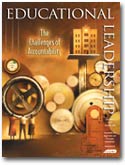A Look Back at the 1980s: International Change and ASCD
During the 1980s, world power shifted. As the decade began, long-standing Cold War tensions between the United States and the Soviet Union seemed as stalemated as ever. The United States, Japan, and West Germany boycotted the 1980 Olympics in Moscow to protest the Soviet Union's military intervention in Afghanistan. President Ronald Reagan, at a convention of the National Association of Evangelicals on March 8, 1983, proclaimed communism “the focus of evil in the modern world” (www.ronaldreagan.com/sp_6.html).
By 1987, however, Reagan and his Soviet counterpart, Mikhail Gorbachev, had signed the first treaty in history to reduce the size of the two nations' nuclear arsenals. By the decade's end, the Berlin Wall had crumbled, the Soviet Union had held its first free elections since 1971, and the once-formidable Soviet empire had collapsed.
As an exciting yet uncertain era in international relations began, ASCD broadened its international focus. The association welcomed its first international affiliate, West Germany, in 1983. ASCD's 1986 Resolution on International Understanding read, in part,ASCD, as an international organization, should strive to collaborate with agencies and organizations engaged in curriculum and supervision in other countries that encourage the sharing of information and research.
Educational Leadership supported ASCD's growing international focus throughout the decade. For example, the March 1982 theme issue on “Education in Other Nations” included articles on education in Japan and China, curriculum reform in the Soviet Union, education and development in the Third World, and instructional supervision in Australia. The December 1986/January 1987 issue—whose theme was “Curriculum Development in the U.S. and Around the World”—presented articles by Dutch administrator Ruud J. Gorter and U.S. educator John I. Goodlad about a 1985 international conference, cosponsored by ASCD and the Dutch National Institute for Curriculum Development, to share ideas about the concept of a core curriculum. And in December 1988/January 1989, Educational Leadership featured a collection of seven articles on the contemporary issue “Teaching About the U.S.S.R.” As author Alex Molnar wrote in one article,Despite the sharp differences in our political and economic systems, the Soviets share a common humanity with us. Fortunately, at the moment there are opportunities to build positively on our shared humanity. If we are to take advantage of these opportunities and learn to live together on this planet—and perhaps even contribute to the common good of all humankind—we need accurate information about each other.
Today, the monolithic threat of world communism has been replaced by a more complex, perhaps even more dangerous, international dynamic. The need for international understanding and cooperation has, if anything, grown. The ASCD community includes members in 147 countries, with international affliliates located in Canada, Europe, the Carribbean, and East Asia. Happy anniversary, ASCD!
—Information compiled by Deborah Perkins-Gough, David Snyder, and Ben Licciardi
Affiliates Respond to Accountability Challenges
ASCD's New Jersey and Pennsylvania affiliates are working to improve the accountability systems in their states.
New Jersey ASCD and its coalition partners have designed a plan to transform the system of statewide assessment, creating a more balanced system of assessment that would acknowledge the state's need to hold schools accountable for student achievement results but also honor the need of local educators to receive timely student achievement data from multiple, valid, and reliable sources. The coalition will pilot new assessment programs in several sites throughout the state. Full statewide implementation is expected within five years.
In May 2003, Pennsylvania ASCD and its coalition partners hosted a forum entitled “Building Assessments to Support Instruction and Accountability” to generate positive dialogue in the education community about using data effectively. ASCD Executive Director Gene R. Carter gave the keynote address. As a result of the forum, state-level decision makers have invited the coalition to help rethink the state's assessment programs.
Improving School Leadership
To improve the preparation of school leaders, ASCD participates in the accreditation of university programs in education administration. As a member of the Educational Leadership Constituent Council (ELCC), ASCD works with the National Association of Elementary School Principals and the National Association of Secondary School Principals to ensure that university programs reflect the National Council for Accreditation of Teacher Education (NCATE) standards for education leadership programs.
The NCATE leadership standards help make university leadership programs more results-oriented. The standards emphasize the need to provide authentic leadership experiences and assessments that identify candidates who are able to apply their skills in real-world settings.
Recently, the Educational Leadership Constituent Council completed its bi-annual review of the programs and the recommendations made by teams of university professors and practicing professionals who assessed the universities' applications. Since 1996, the Council has approved 127 programs, granting national recognition to 72 percent of the applicants. In addition, 20 states use these standards in their own reviews of education leadership programs, and 26 states require that their institutions of higher education submit to ELCC/NCATE reviews.
ASCD Resources for “The Challenges of Accountability”
- Marzano, R. J. (2002). What Works in Schools: Translating Research into Action. Price: $21.95 (member); $25.95 (nonmember).
- Popham, W. J. (2003). Test Better, Teach Better. Price: $19.95 (member); $24.95 (nonmember).
- Schmoker, M. (1999). Results: The Key to Continuous School Improvement (2nd ed.). Price: $16.95 (member); $20.95 (nonmember).
- What Works in Schools (3-tape series). (2003). Price: $440 (member); $540 (nonmember).
- Motivation: The Key to Success in Teaching and Learning (3-tape series). Price: $410 (member); $520 (nonmember).
- A Visit to a Motivated Classroom (1 tape and Viewer's Guide). Price: $145 (member); $170 (nonmember).This video visits the classroom of high school mathematics teacher Marilyn Garber and analyzes how she exhibits the behaviors and characteristics of competent teachers as identified by Marzano's meta-analysis, What Works in Schools. The program also demonstrates and analyzes student activities that build student motivation.
- What Works in Schools Online Survey is a comprehensive tool for identifying improvement targets and assessing progress. Prices begin at $599 per school; visit <LINK URL="http://www.whatworksinschools.org">www.whatworksinschools.org</LINK> for more information.
Books on the Bayou Bash
Mark your calendars and join your colleagues for the ASCD Annual Conference's kickoff event on March 19, 2004, at the Morial Convention Center in New Orleans. The Books on the Bayou Bash is a service project and social event. Your ticket to the event is a book! Bring a children's book to donate to the New Orleans Public Schools. Then enjoy the festivities—food, fun, music, and dancing—with your fellow educators from around the world. McGraw-Hill Education will be sponsoring the event.

